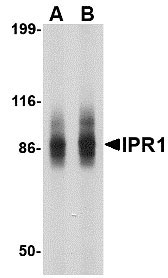IPR1 Antibody
- SPECIFICATION
- CITATIONS
- PROTOCOLS
- BACKGROUND

Application
| WB, E |
|---|---|
| Primary Accession | Q9HB58 |
| Other Accession | NP_004501, 190343008 |
| Reactivity | Human, Mouse, Rat |
| Host | Rabbit |
| Clonality | Polyclonal |
| Isotype | IgG |
| Calculated MW | 78396 Da |
| Application Notes | Ipr1 antibody can be used for detection of Ipr1 by Western blot at 1 - 2 µg/mL. |
| Gene ID | 3431 |
|---|---|
| Target/Specificity | SP110; |
| Reconstitution & Storage | IPR1 antibody can be stored at 4℃ for three months and -20℃, stable for up to one year. As with all antibodies care should be taken to avoid repeated freeze thaw cycles. Antibodies should not be exposed to prolonged high temperatures. |
| Precautions | IPR1 Antibody is for research use only and not for use in diagnostic or therapeutic procedures. |
| Name | SP110 |
|---|---|
| Function | Transcription factor. May be a nuclear hormone receptor coactivator. Enhances transcription of genes with retinoic acid response elements (RARE). |
| Cellular Location | Nucleus {ECO:0000255|PROSITE-ProRule:PRU00185, ECO:0000255|PROSITE-ProRule:PRU00747, ECO:0000269|PubMed:10913195, ECO:0000269|PubMed:25593309}. Note=Found in the nuclear body |
| Tissue Location | Highly expressed in peripheral blood leukocytes and spleen. Detected at intermediate levels in thymus, prostate, testis, ovary, small intestine and colon, and at low levels in heart, brain, placenta, lung, liver, skeletal muscle, kidney and pancreas |

Thousands of laboratories across the world have published research that depended on the performance of antibodies from Abcepta to advance their research. Check out links to articles that cite our products in major peer-reviewed journals, organized by research category.
info@abcepta.com, and receive a free "I Love Antibodies" mug.
Provided below are standard protocols that you may find useful for product applications.
Background
IPR1 Antibody: Susceptibility to tuberculosis (TB) in mice has recently been attributed to the IPR1 gene. IPR1 is a member of the SP100/SP140 family of nuclear body proteins and encodes a leukocyte-specific nuclear body component. The protein can function as an activator of gene transcription and may serve as a nuclear hormone receptor coactivator. Alternative splicing has been observed for this gene and three transcript variants, encoding distinct isoforms, have been identified. SP110 is the closest homolog of the IPR1 protein in humans. The IPR1/Sp110 gene product might play a role in integrating signals generated by intracellular pathogens with mechanisms controlling innate immunity, cell death, and pathogenesis. IPR1/Sp110 is up-regulated after infection with M. tuberculosis and required by Anaplasma phagocytophilum for infection of human promyelocytic cells. Defects in Sp110 are a cause of severely impaired resistance to infection by M. tuberculosis.
References
Pan H, Yan BS, Rojas M, et al. Ipr1 gene mediates innate immunity to tuberculosis. Nature2005; 434:767-72.
Bloch DB, Nakajima A, Gulick T, et al. Sp110 localizes to the PML-Sp100 nuclear body and may function as a nuclear hormone receptor transcriptional coactivator. Mol. Cell Biol.2000; 20:6138-46.
De la Fuente J, Manzano-Roman R, Blouin EF, et al. Sp110 transcription is induced and required by Anaplasma phagocytophilum for infection of human promyelocytic cells. BMC Infect. Dis.2007; 7:110.
Tosh K. Campbell SJ, Fielding K, et al. Variants in the SP110 gene are associated with genetic susceptibility to tuberculosis in West Africa. Proc. Natl. Acad. Sci.2006; 103:10364-8.
If you have used an Abcepta product and would like to share how it has performed, please click on the "Submit Review" button and provide the requested information. Our staff will examine and post your review and contact you if needed.
If you have any additional inquiries please email technical services at tech@abcepta.com.













 Foundational characteristics of cancer include proliferation, angiogenesis, migration, evasion of apoptosis, and cellular immortality. Find key markers for these cellular processes and antibodies to detect them.
Foundational characteristics of cancer include proliferation, angiogenesis, migration, evasion of apoptosis, and cellular immortality. Find key markers for these cellular processes and antibodies to detect them. The SUMOplot™ Analysis Program predicts and scores sumoylation sites in your protein. SUMOylation is a post-translational modification involved in various cellular processes, such as nuclear-cytosolic transport, transcriptional regulation, apoptosis, protein stability, response to stress, and progression through the cell cycle.
The SUMOplot™ Analysis Program predicts and scores sumoylation sites in your protein. SUMOylation is a post-translational modification involved in various cellular processes, such as nuclear-cytosolic transport, transcriptional regulation, apoptosis, protein stability, response to stress, and progression through the cell cycle. The Autophagy Receptor Motif Plotter predicts and scores autophagy receptor binding sites in your protein. Identifying proteins connected to this pathway is critical to understanding the role of autophagy in physiological as well as pathological processes such as development, differentiation, neurodegenerative diseases, stress, infection, and cancer.
The Autophagy Receptor Motif Plotter predicts and scores autophagy receptor binding sites in your protein. Identifying proteins connected to this pathway is critical to understanding the role of autophagy in physiological as well as pathological processes such as development, differentiation, neurodegenerative diseases, stress, infection, and cancer.


